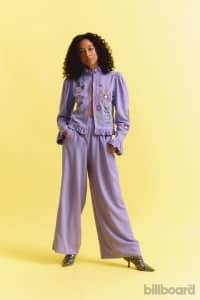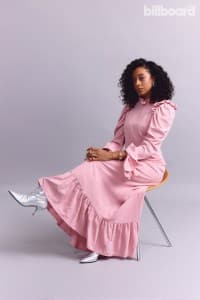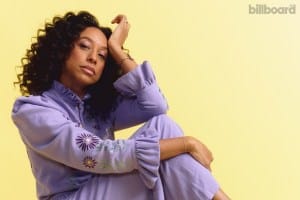
Photography by Shaun Peckham
Shaun Peckham
Corinne Bailey Rae has a certain affect on people. She’s the kind of artist that even a brief glimpse of can spark a musical memory even in the most public of places. “I’ll be in an elevator and people see me walk in and they just start whistling ‘Put Your Records On’ to themselves,” Rae laughs. “I don’t even think they notice they’re doing it! But I just love that it has that impact on people.”
That particular record, first released in 2006 from her self-titled debut LP, burrows in deep. The song reached No. 2 on the U.K. Singles Chart, appeared on the Billboard Hot 100, and was nominated for two categories at the Grammys the following year: song of the year and record of the year. At almost a billion streams on Spotify alone, its place in the 21st century British pop canon is secure, and its gorgeous melody and empowering message resonate almost two decades down the line.
We meet Rae in her hometown of Leeds ahead of her performance at Billboard U.K. Live at Manchester’s Aviva Studios, home of Factory International. The intimate performance will kick off a series of 20th anniversary celebrations for the 46-year-old musician, which also includes the release of a children’s book Put Your Records On in March, and a show at the iconic Royal Albert Hall in London in October 2026.
Her debut album, Corinne Bailey Rae, was released in February 2006 and peaked at No. 1 on the U.K.’s Official Albums Chart, and at No. 4 on the Billboard 200, an astonishing feat for a British debut solo star. The LP featured another breakout song “Like a Star,” which showcased Rae’s gorgeous vocal capabilities and wistful, impactful songwriting style.
She was soon in the same studios as her heroes, working with them on new music and taking invaluable advice. Stevie Wonder, Prince, Herbie Hancock and Bill Withers, to name a few, all recognised Rae’s talent. Accolades continued to flow Rae’s way – a Grammy win for best R&B performance in 2012, for one – and her second studio LP The Sea (2010) was nominated for the U.K.’s Mercury Prize. Informed by the death of her husband Jason Rae in 2008, the record showcased moments of raw grief, but also hope and healing.

Photography by Shaun Peckham
Shaun Peckham
Her sound, soulful pop with nods to indie-rock and R&B, earned her placements on 50 Shades Darker soundtrack and a brief cameo on Tyler, the Creator’s Flower Boy LP. In 2023, she released Black Rainbows, a sprawling epic that was influenced by an exhibition held at Stony Island Arts Bank in Chicago which focused on Black history in the city. Fans and critics alike were stunned by the LP, one that was packed in feminist punk (“New York Transit Queen”), spiritual jazz (“Before The Throne of the Invisible God”), and big tent rave (“Put It Down”). Reviewers commended the stark left-turn, and another Mercury Prize nod beckoned.
It was on that awards night – ultimately won by Leeds’ band English Teacher for This Could Be Texas – that Rae’s impact and longevity came into view for her. “For some reason I was behaving like such a mother hen… totally unsolicited, by the way,” she laughs, reminiscing on meeting fellow Yorkshire artist Nia Archives and country-pop crossover star CMAT. “I was going up to these cool young musicians like, ‘Hi, you don’t know me, but here’s some advice: don’t feel like you have to rush your second album, do your thing.’”
Rae’s advice, no doubt, was heeded. Her stellar career has thrown up situations that she could only have dreamed of when she was gigging in the indie-rock band Helen in Leeds in the early ‘00s, and seen her overcome the most difficult of challenges. Almost twenty years to the day since “Like A Star,” her debut single, was released, she reflects on the lessons she’s learned, the rewarding creative journey she’s been on – and what comes next.
We’re speaking around the anniversary of your debut single. How do you look back on that era?
I have really fond memories of making “Like A Star.” I think it was quite different for the time. It was more like my true voice, and quite conversational and small. It wasn’t what you might think is a ‘pop voice.’ A lot of doors had been opened by people like Björk or Martina Topley Bird [collaborator on Tricky’s Maxinquaye] and that made me realize there were all these different ways to sing. It didn’t have to be like Mariah Carey-style, with that unreachable big singing voice.
Once “Like A Star” was released, things moved quickly…
The pace of it was quite staggering. The residency I was performing at in London over the course of four Thursdays went from not being sold out in week one, to queues around the block, and then I ended up performing on [BBC Music show] Later… with Jools Holland so early on in my career. This was all before the album came out, so I thought, ‘Wow, I keep getting asked to do stuff, so I’ll just say yes to everything.’ The album came out and I remember being on tour and someone telling me that the LP had gone to No. 1. I was like, ‘Wait what?’ I just couldn’t believe it.
That’s all you want as a musician is to get somewhere. And I had tried for a few years with my band and we didn’t get much love. This was my first record and it felt like it’d gone from 0 to 100.
Did you cope with the attention OK?
I think I did, you know. I was a little bit older at 25, so it wasn’t like I was 19 and still figuring out who I was. I had good friends and had good advice from my manager and friends. I also feel like when I was in the US, certain people would look after me and lean into me and give some words of advice. Whether that was Questlove, Prince, Stevie Wonder, just these people who were gods of music, but also a lot older than me.
I remember Herbie Hancock specifically saying not to rush into the second record and to take a minute. I thought that was really good advice to not feel the pressure, or feel that everyone would fall out of love with me.
When I came to my second record I felt that I had a different thing to say. That was then the moment to keep pushing out. Even when we played live at that time, I always added in this Led Zeppelin cover of “Since I’ve Been Loving You.” I wanted people to see I could do other things, and make sure that I wasn’t in a box.

Photography by Shaun Peckham
Shaun Peckham
Your life changed quite significantly between album one and two, following the loss of your husband. How did that event inform what you were doing creatively?
“When I look back at [debut LP Corinne Bailey Rae], it’s on the other side of… not a wall, but a divide between my two adult lives. That moment [Jason’s death] felt like the end of what that first album term was. I felt like my life was divided between the before and after of that.
As well as changing my life, it also changed my career in a really big way. I knew that I wasn’t really robust enough to be in an industry ‘capitalizing’ on the big industry success of the first record, and setting up sessions with all these big names anyway. I just wasn’t in that place, and the label really knew that and I think that they really left me to it.
But by the time the third record came around [The Heart Speaks in Whispers, 2016] they were really on my case. That put so much pressure on me, which was really difficult. That made it take miles longer and it wasn’t what they wanted and it was more tricky.
In the past you mentioned that the press expected a certain response to Jason’s passing, but you didn’t give them what they wanted…
It was a very aggressive time journalistically, but I just feel really lucky that I’ve had good people around me. I knew Amy [Winehouse] and that was really frightening to see that side of people, and to see the vulnerability of going from being a cool jazz singer, to the biggest thing in British pop music. That is not a place you desire to be – no one wants to be there. Plus, there was a need to tear down successful people in this country, which has been so strong for years, and it was definitely like that for women at that time.

Photography by Shaun Peckham
Shaun Peckham
Black Rainbows was a record that really expanded your sonic palette. How do you look back on that record?
I love that album so much. It felt really special to me because it was so freeing. I’d just come out of my label deal and I wasn’t really looking for anything to do next.
But I was invited to come to the Stony Island Arts Bank [a Chicago-based archive of Black art and culture], and I was just so inspired. All the time we were in there, these people were coming in and all of these black performers, photographers, documentary-makers. I ended up writing about all of these images and stories from Chicago’s history just to try and make sense and process what I’d seen.
That LP was considered something of a ‘left-turn’ for you. Did you feel that was a fair assessment?
It was a left-turn in terms of what I would share, I guess. In my band , I used to play a lot of indie music and heavy stuff. And before that, I was in a church where I’d play these big wig-outs that stretched on for over 20 minutes. But sharing that felt very freeing and felt new.
Black Rainbows was initially going to be a side project, and it wasn’t going to have my name on it – I didn’t want to feel like I was messing up what I’d done before. But I like that music allows you room to grow to gather an audience that trusts you. 20 years is a long time in anyone’s life, and you don’t want to stay still and not change, or to be the same person at 46 that you were at 26.
What changes have you seen in the music industry over the past 20 years?
The biggest change is that people don’t think you should pay money to have music. It’s such a different paradigm, but music is almost a conceptual thing. There’s a generation of people who think that music just happens and appears on streaming services, their favorite shows or wherever. There’s a real disconnect between the people who make the music and the listener.
I can’t say how that might change but at the same time, if it doesn’t all we’re going to get is the music of a really narrow group of people: artists who can do a really good sponsorship with a trainer brand to fund their creative work, or rich people with privileged backgrounds. We’re missing out as a society on what working class people or struggling artists might think if we’re not going to pay artists to do what they do.
Tell us about the children’s book Put Your Records On that you’re releasing in 2026…
I was reading a lot of children’s books for my children when I came up with the idea – and I just thought that I could say something here. I wanted to speak about music and the feelings that different songs can conjure, and that there’s a song for every feeling that you’ll ever have. Music has always been a way to explore my feelings and a way to free me. I’m finding writing, with the pen and the words, really exciting and liberating. I’d love to do more in the future.
And musically, are you working on a new project at the moment?
I am working on new music. That’s the thing I’m really excited about is trying to work out: what the sound and direction is, what I want to say and who it’s going to be with. I feel really inspired right now, and Black Rainbows has really freed me into not overthinking things – that’s been really important.

Photography by Shaun Peckham
Shaun Peckham
Shoot production by WMA Studios. Photography by Shaun Peckham. Photography assistance by Jack Moss. Grooming by Bianca Simone. Shot at Light Space Studios, Leeds.